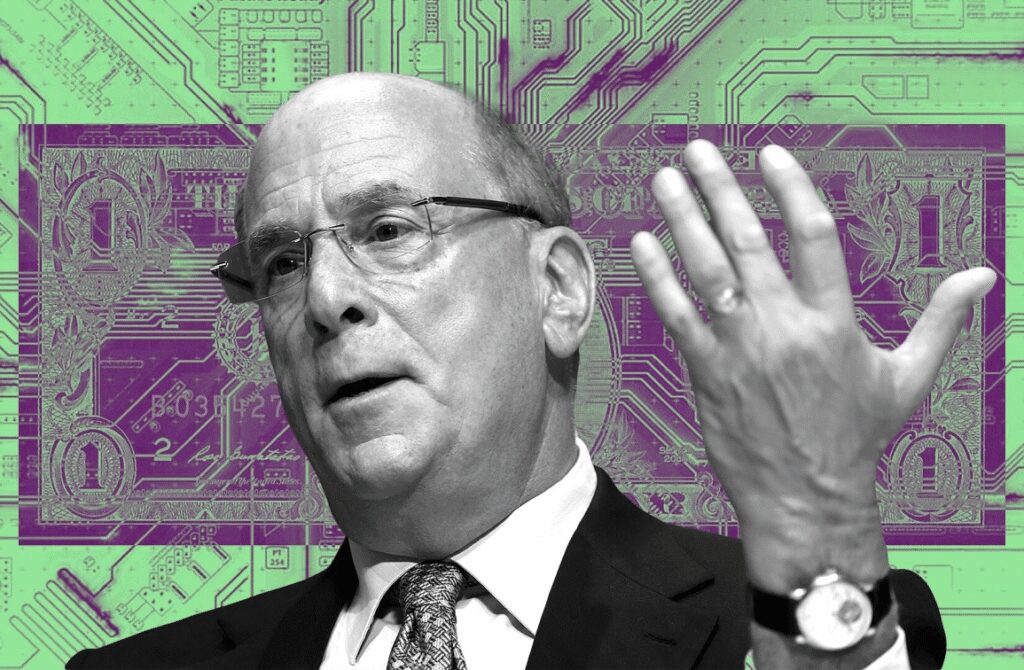Why BlackRock and Fidelity Are Quietly Turning Crypto into the New Wall Street: Examining the Shift
BlackRock and Fidelity are reshaping the crypto world by integrating it into traditional financial systems. By launching crypto ETFs and investing in blockchain, they are quietly turning crypto into the new Wall Street. This article explores why BlackRock and Fidelity are quietly turning crypto into the new Wall Street, what these moves are happening, and what the implications are for the future of finance.
Key Takeaways
- BlackRock and Fidelity are leading the integration of cryptocurrencies into traditional finance by launching spot Bitcoin ETFs and investing in blockchain technology.
- Institutional adoption, supported by clearer regulatory frameworks, is transforming the cryptocurrency market, legitimizing digital assets as a viable investment class.
- Technological advancements in blockchain and decentralized finance are essential for enhancing transaction speed and security, driving broader crypto adoption and market stability.
BlackRock and Fidelity’s Strategic Moves in Crypto

BlackRock and Fidelity are taking significant steps to integrate digital assets into their portfolios, acknowledging the growing importance of cryptocurrencies. Launching crypto ETFs and investing in blockchain technology, these firms provide new avenues for crypto exposure while ensuring secure and efficient transactions within the financial system.
These strategic initiatives position BlackRock and Fidelity at the forefront of the evolving landscape of digital assets. These actions indicate a future where crypto is an integral part of traditional finance, bridging the gap between the old and new financial worlds.
Launch of Crypto ETFs
The introduction of BlackRock’s and Fidelity’s spot Bitcoin ETFs marks a pivotal moment in the acceptance of cryptocurrency within mainstream finance. These ETFs provide institutional investors with a regulated and secure avenue to gain exposure to Bitcoin without the need for direct ownership, making it easier for traditional investors to enter the crypto market.
In early 2024, Wall Street firms launched these spot Bitcoin ETFs to embrace cryptocurrency. This move not only signifies a major shift towards crypto adoption but also sets a precedent for other financial institutions to follow suit, further legitimizing digital assets in the eyes of institutional investors.
Investment in Blockchain Technology
BlackRock and Fidelity are actively investing in blockchain technologies to enhance transaction security and efficiency within the financial ecosystem. Focusing on blockchain infrastructure, these firms aim to make financial operations both secure and highly efficient, reflecting blackrock’s commitment to innovation.
Their focus includes allocating resources towards companies innovating in blockchain technology, positioning themselves at the forefront of this emerging sector. Advancements in blockchain technology enable seamless on-chain settlements and ownership transfers, crucial for capital markets’ operational needs, including staking.
Institutional Adoption: The New Wave of Crypto Integration

BlackRock and Fidelity are increasingly integrating digital assets into their investment strategies, reflecting a broader shift in the financial industry. This integration is not just about providing new investment options but about reshaping the very fabric of traditional finance to accommodate the rise of cryptocurrencies.
The involvement of large asset managers like BlackRock and Fidelity legitimizes cryptocurrency as an asset class, leading to greater regulatory acceptance and integration into mainstream finance. Their participation is driving significant transformations in the cryptocurrency market landscape, influencing overall market trends and fostering a new wave of crypto adoption.
Tokenized Assets in Traditional Finance
Companies like BNY Mellon and Morgan Stanley are pioneering the integration of tokenized assets into traditional financial systems. These institutions are adapting financial frameworks to accommodate tokenized assets, poised to revolutionize traditional finance.
Distributed ledger technology (DLT) reshapes capital markets by enhancing liquidity and facilitating real-time data exchange among key participants. This technological advancement is crucial for integrating cryptocurrencies into traditional financial markets, focusing on factors like dependability and efficiency.
Regulatory Clarity and Its Impact
Recent regulatory developments, including the passing of the GENIUS Act, are creating clearer guidelines for crypto adoption among institutions, providing long awaited clarity. These policy changes are facilitating a more favorable environment for an institution to adopt cryptocurrencies, enhancing the overall transparency of the market.
Enhanced regulatory frameworks are expected to improve retail investor protections and access to crypto markets. Institutions are addressing counterparty risks by establishing clear governance frameworks and compliance measures, which are crucial for building trust in the crypto market.
Overcoming Barriers to Retail Investor Access

Retail investors often face significant obstacles that hinder their full participation in crypto markets. These barriers range from counterparty risks to security concerns, making it challenging for retail investors to confidently engage in crypto transactions.
The specifics of these barriers include counterparty risk and security concerns, followed by future prospects for retail investors as institutional adoption grows, highlighting the importance of expertise.
Counterparty Risk and Security Concerns
Counterparty risk in cryptocurrencies arises when one party fails to meet its obligations, potentially leading to significant financial losses for the other party. The decentralized nature of crypto transactions increases this risk due to the lack of regulatory oversight and intermediaries that usually ensure transactional trust.
To mitigate counterparty risk, investors are encouraged to:
- Perform thorough due diligence on potential trading partners.
- Evaluate the security practices of these partners.
- Use multi-signature wallets, which add security by requiring multiple approvals for transactions, further reducing risk.
Future Prospects for Retail Investors
As institutional adoption increases, retail investors are expected to benefit from more transparent and secure trading environments, enhancing their market participation. Institutional interest in crypto is driving the development of more secure and accessible trading platforms for retail investors.
Growing institutional involvement may improve retail investors’ access to crypto markets through enhanced regulatory frameworks. This increased adoption of cryptocurrencies by institutions is expected to lead to more secure and transparent trading environments for retail investors.
The Role of Technology in Transforming Capital Markets

Technological advancements are critical for crypto to achieve the wall street standards required by Wall Street, focusing on reliability and speed as the next wave. Efforts to upgrade blockchain technology aim to handle high transaction volumes and ensure reliability akin to traditional capital markets.
These technological improvements are set to significantly impact capital market dynamics, enhancing integration with traditional finance. The specifics of upgrading blockchain infrastructure and innovations in decentralized finance (DeFi) will be explored.
Upgrading Blockchain Infrastructure
Tokenization allows traditional assets to be converted into digital tokens, enhancing transaction speed and market access. This process of upgrading blockchain infrastructure is essential for expanding the capabilities of crypto markets, making them more efficient and reliable.
Improving the underlying technology enables blockchain to support higher transaction volumes and maintain reliability, aligning with traditional financial market standards. This is crucial for enabling broader crypto adoption and integration with existing financial systems.
Innovations in Decentralized Finance (DeFi)
DeFi innovations are rapidly evolving to accommodate the specific requirements of institutional investors, as traditional financial institutions seek to harness blockchain technology. Advanced yield farming protocols and liquidity pools now enhance security and reduce risks, addressing institutional asset managers’ concerns.
Integrating decentralized applications (dApps) into broader financial services renews major asset managers’ interest in digital assets, furthering crypto adoption.
The future landscape of DeFi is expected to seamlessly blend with institutional finance, fostering a new era of financial solutions that leverage decentralized technologies.
The Impact of Major Asset Managers on Market Dynamics

The participation of major asset managers like BlackRock and Fidelity is significantly impacting market dynamics. Their involvement has surged transaction volume, solidifying the US market’s position as the world’s largest crypto market by absolute volume. This increased participation is also driving significant transformations in the cryptocurrency market landscape.
BlackRock and Fidelity’s cryptocurrency ETFs dominate the market, collectively holding 75% of U.S. Bitcoin ETF funds. This dominance not only influences overall market trends but also sets a precedent for other financial institutions to follow, further legitimizing digital assets in the eyes of institutional investors.
Liquidity and Market Stability
Institutional investments, particularly through crypto ETFs, have significantly increased market liquidity, contributing to a more stable trading environment. This participation enhances liquidity, which helps to stabilize prices and reduce overall volatility in crypto markets.
The introduction of low-fee ETFs by major asset managers has played a crucial role in this liquidity boost, leading to greater market stability and reduced price fluctuations. Institutional participation in cryptocurrency markets enhances liquidity, vital for market stability and mitigating sharp price fluctuations.
Long-Term Value and Wealth Management
Institutional investors are increasingly viewing cryptocurrencies as a valuable long-term asset, integrating them into wealth management strategies. Major institutions are viewing cryptocurrencies as key components of long-term investment strategies, incorporating them into wealth management and estate planning for their clients.
This integration of cryptocurrencies into wealth management strategies is expected to enhance portfolio diversification and estate plans, making digital assets a viable long-term investment option. Institutions are increasingly seeing the value in these assets for long-term wealth management.
Summary
In summary, the strategic moves by BlackRock and Fidelity to integrate digital assets into their portfolios are transforming the financial landscape. Their launch of crypto ETFs and investment in blockchain technology are paving the way for broader crypto adoption and integration into traditional finance. The broader shift towards institutional adoption is driving regulatory clarity and creating more secure and transparent trading environments for retail investors.
As technology continues to evolve, the role of blockchain and DeFi innovations will be crucial in transforming capital markets. The impact of major asset managers on market dynamics, particularly in terms of liquidity and long-term value, cannot be overstated. This transformation is not just a trend; it is the future of finance. Embrace it, and stay ahead of the curve.
Frequently Asked Questions
How are BlackRock and Fidelity integrating digital assets into their portfolios?
BlackRock and Fidelity are incorporating digital assets into their portfolios by launching cryptocurrency ETFs and investing in blockchain technology to enhance transaction security and efficiency. This strategy reflects their commitment to adapting to the evolving financial landscape.
What is the significance of the launch of spot Bitcoin ETFs by BlackRock and Fidelity?
The launch of spot Bitcoin ETFs by BlackRock and Fidelity signifies a crucial step towards mainstream acceptance of cryptocurrency, providing institutional investors with a regulated means to invest in Bitcoin without direct ownership. This development enhances the legitimacy of Bitcoin in traditional finance.
What are the main benefits of institutional adoption of cryptocurrencies?
The main benefits of institutional adoption of cryptocurrencies are increased market liquidity, enhanced regulatory clarity, and more secure trading environments, which collectively promote broader acceptance and integration into wealth management strategies. This shift not only fosters confidence among retail investors but also stabilizes the overall cryptocurrency market.
How are technological advancements impacting the integration of crypto with traditional finance?
Technological advancements are significantly enhancing the integration of crypto with traditional finance by improving blockchain infrastructure and decentralized finance capabilities, which boost transaction speed, market access, and reliability. This progress is essential for meeting Wall Street’s standards and fostering wider adoption.
What role do major asset managers play in the stability and growth of the crypto market?
Major asset managers significantly contribute to the stability and growth of the crypto market by enhancing liquidity, mitigating price volatility, and incorporating cryptocurrencies into long-term investment strategies. Their involvement fosters greater investor confidence and mainstream adoption of digital assets.

